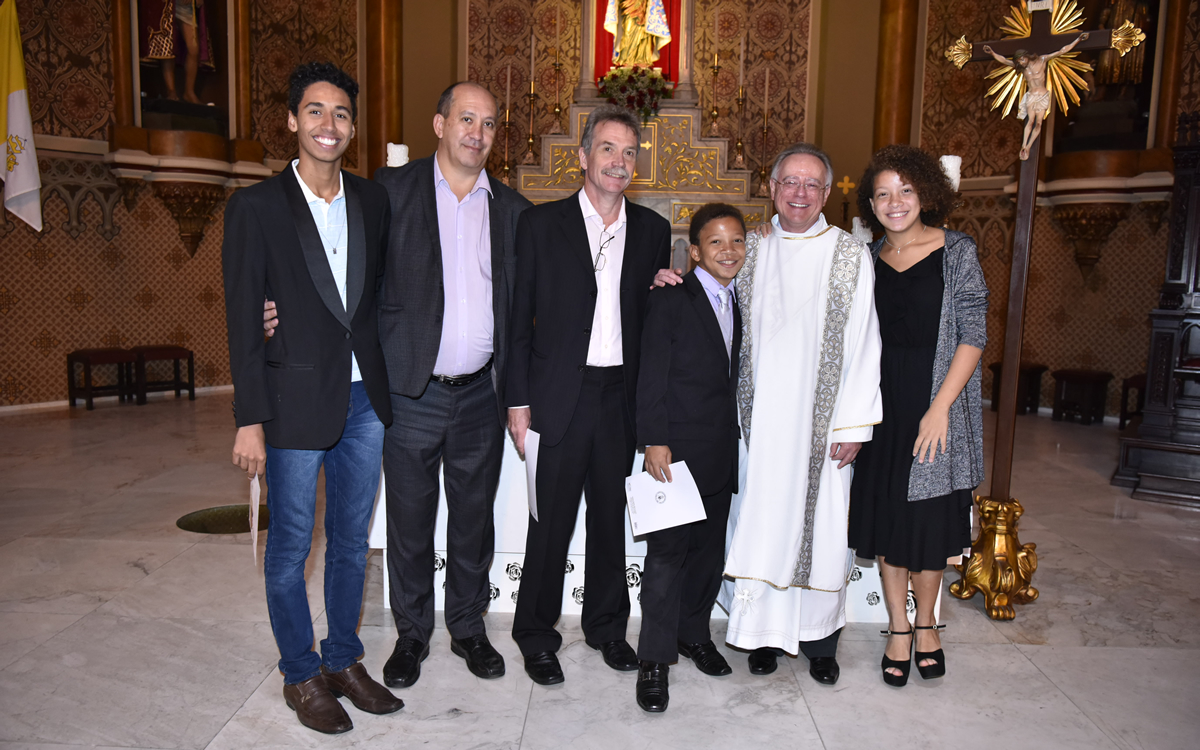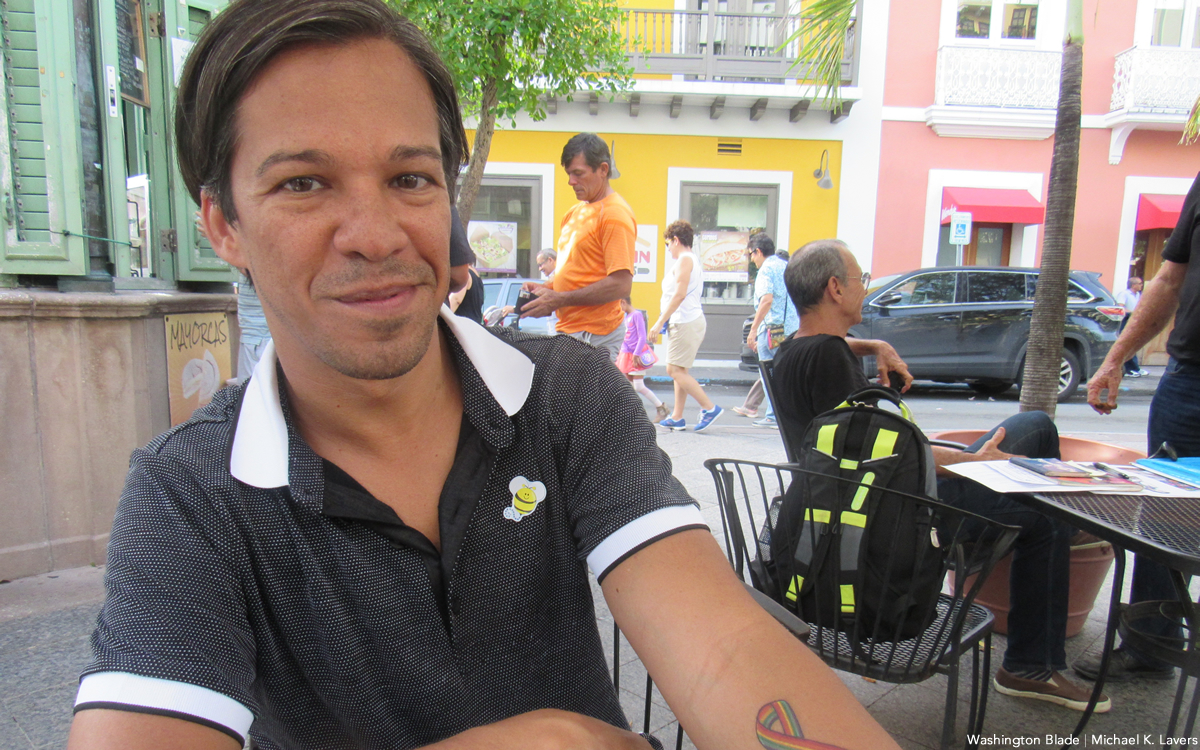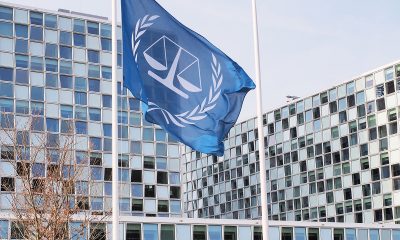World
Activists around the world welcome Pope Francis’ comments against criminalization laws
Church teaching about homosexuality remains unchanged

Activists around the world say Pope Francis’ comments against criminalization laws are a milestone for the global LGBTQ and intersex rights movement.
Toni Reis, president of Aliança Nacional LGBTI+, a Brazilian LGBTQ and intersex advocacy group, told the Washington Blade that Francis’ comments are “a message that needs to be assimilated by at least 70 countries that still criminalize homosexuality in some way, including 11 countries in which the death penalty can be applied.”
Reis and his husband, David Harrad, in 2017 baptized their three adopted children at a Catholic cathedral in Curitiba, a city in southern Brazil. Reis later received a letter on official Vatican letterhead that said Francis “wishes you happiness, invoking for your family the abudance of divine graces in order to live steadfastly and faithfully as good children of God and of the church.”
“We are unable to find in the recorded words of Jesus Christ, on whom the Christian faith is founded, any reference to homosexuality as a sin,” Reis told the Blade. “There is no longer room for deliberately decontextualized interpretations of the Old Testament and the books of certain Apostles in this sense.”
Francis during an exclusive interview with the Associated Press on Jan. 24 described criminalization laws as “unjust” and said “being homosexual is not a crime.”
The pontiff acknowledged some Catholic bishops support criminalization laws and other statutes that discriminate against LGBTQ and intersex people. Francis told the Associated Press that cultural backgrounds contribute to these attitudes, and added “bishops in particular need to undergo a process of change to recognize the dignity of everyone.”

Chantale Wong, the U.S. director of the Asian Development Bank who was born in Shanghai, is the first openly lesbian American ambassador.
Wong’s aunt and uncle enrolled her in a Catholic bording school in Macau, which at the time was a Portuguese colony, after she fled China with her grandmother in 1960. Wong was baptized and given the name Chantale after St. Jane Frances de Chantale.
She later attended an all-girls Catholic high school in Guam.
“He is definitely my pope,” tweeted Wong on Jan. 25.
He’s definitely my #Pope #PopeFrancis! The AP Interview: Pope says homosexuality not a crime https://t.co/mN6XwzLdo5
— Ambassador Chantale Wong (@chantalew) January 25, 2023
Luxembourg Prime Minister Xavier Bettel, who is openly gay, in a tweet thanked Francis “for your strong and clear words against the criminalization of LGBTIQ+ persons in the world.” Victor Madrigal-Borloz, the independent U.N. expert on LGBTQ and intersex issues who traveled to Cambodia last month, echoed Bettel.
“Criminalization based on sexual orientation is contrary to international human rights law,” tweeted Madrigal-Borloz on Jan. 25. “I welcome this recognition by (the pope.)”
Criminalization based on sexual orientation is contrary to international human rights law. I welcome this recognition by @Pontifex. #IESOGI@free_equal https://t.co/YlzffgRUKT
— IE SOGI, Victor Madrigal-Borloz (@victor_madrigal) January 25, 2023
Homosexuality is the ‘real sin’
The Vatican’s tone towards LGBTQ and intersex issues has softened since Francis assumed the papacy in 2013.
Francis — who vehemently opposed a marriage equality bill in his native Argentina before then-President Cristina Fernández de Kirchner signed it into law in 2010 — a decade later publicly backed civil unions for same-sex couples.
The pontiff in 2013 said gay men and lesbians should not be marginalized.
Francis in 2016 later said the Roman Catholic Church should “ask forgiveness” from gay people over the way it has treated them. The pontiff in 2017 compared politicians who use hate speech against LGBTQ and intersex people and other minority groups to Adolf Hitler.
The Vatican in 2020 gave money to a group of transgender sex workers in Italy who were struggling to survive during the coronavirus pandemic. Francis in 2021 named Juan Carlos Cruz, a gay Chilean man who is a survivor of clergy sex abuse, to a commission that advises him on protecting children from pedophile priests.
Francis last year during several of his weekly papal audiences met with trans people who were living at a Rome church.
Church teachings on homosexuality and gender identity remain unchanged despite these overtures.
Francis during the Associated Press interview referred to LGBTQ and intersex issues within the context of “sin.” The pontiff later sought to clarify the comment.
“When I said it is a sin, I was simply referring to Catholic moral teaching, which says that every sexual act outside of marriage is a sin,” wrote Francis in a handwritten letter he sent to the Rev. James Martin, editor of Outreach, a website for LGBTQ and intersex Catholics, on Jan. 27.
Pedro Julio Serrano, founder of Puerto Rico Para Todes, a Puerto Rican LGBTQ and intersex rights group, during an interview with the Blade acknowledged Francis “is giving a message that criminalization of the LGBTQ+ community must be fought.” Serrano added, however, the pontiff’s comments do not change church teachings.
“There is no change in dogma, there is no change in doctrine and nothing has changed in the catechism of the Catholic Church. Everything remains the same,” Serrano told the Blade. “As long as all that remains the same, there is no change.”
Serrano further stressed Francis’ categorization of homosexuality as a “sin” is paradoxical.
“Homophobia: That is the real sin,” said Serrano.

Frank Mugisha, executive director of Sexual Minorities Uganda, a Ugandan LGBTQ and intersex rights group, on Tuesday noted to the Blade that he is Catholic.
Uganda is among the dozens of countries in which consensual same-sex sexual relations remain criminalized.
Singapore, Barbados, St. Kitts and Nevis, Antigua and Barbuda, Botswana, Bhutan and India have decriminalized homosexuality in recent years.
Mugisha said Sexual Minorities Uganda welcomes Francis’ statement, which he made ahead of his trip to Congo and South Sudan. (Consensual same-sex sexual activity is legal in Congo, while South Sudan continues to criminalize it.)
“Being Catholic, I know the Catholic Church will respect the pope’s views and I hope the church in Africa starts working with us towards discrimination of homosexuality,” Mugisha told the Blade.
ILGA World Co-Secretaries General Luz Elena Aranda and Tuisina Ymania Brown in response to Francis’ comments said “such a simple statement has now the potential to initiate a much-needed change and will provide relief to millions of persons in our communities across the world.” ILGA World Executive Director Julia Ehrt, like Serrano, said Vatican doctrine towards LGBTQ and intersex people needs to change if the pontiff’s position against criminalization laws will have any meaningful impact.
“We urge the Holy See to turn these words into concrete action,” said Ehrt. “The Catholic Church and its institutions can and should play an active role in supporting decriminalization efforts across the world and within the United Nations and multilateral fora, where demands to scrap these profoundly wrong laws have long been reiterated.”
Outright International, a New York-based global LGBTQ and intersex rights group, in its response to Francis’ comments also noted church teachings.
“We welcome Pope Francis’ message of inclusion and acceptance,” said Outright International in a statement to the Blade. “Discrimination, persecution and marginalization are common experiences for LGBTIQ individuals and communities around the world. In some countries, many are subjected to conversion practices and its lifelong physical and emotional damages, which are often performed and sanctioned in the name of church teachings.”
“Religious leaders have a storied history of perpetuating misconceptions about same-sex relations, promoting them as threats to society. As such, LGBTIQ people are subject to violent attacks, harassment and social stigmatization. The church’s actions have also influenced efforts to oppose the advancement of human rights for LGBTIQ people,” added Outright International. “Our hope is that the pope’s statement will foster respect, dignity and conversations that will lead to change in attitudes and lasting legal protections in this arduous journey for full equality.”
India
India’s first transgender healthcare clinic reopens
Mitr Clinic closed after losing USAID funding

A U.S. Agency for International Development funding freeze in January forced the closure of India’s Mitr Clinic, the country’s first transgender healthcare facility, disrupting critical services for a vulnerable population.
Six months later, the clinic has reopened as Sabrang Clinic, reviving access to essential care for the transgender community.
Major Indian corporations, including some of the nation’s largest multinationals, stepped up with substantial financial support. Their backing has enabled Sabrang Clinic to resume its mission of delivering specialized, stigma-free medical services.
The former Mitr Clinic on May 2 reopened as the Sabrang Clinic. YR Gaitonde Center for AIDS Research and Education, an HIV/AIDS service organization, manages the facility.
The Sabrang Clinic sparked controversy in the U.S. when U.S. Sen. John Kennedy (R-La.) in February denounced its USAID funding, arguing that American taxpayer dollars should not support trans healthcare initiatives abroad. President Donald Trump amplified the criticism, labeling the agency’s spending on such programs as “wasteful” and aligning with his administration’s broader push to curb federal support for gender-affirming care. White House press secretary Karoline Leavitt further fueled the debate, citing the clinic’s funding as part of a pattern of USAID’s “radical” expenditures, while House Speaker Mike Johnson (R-La.) echoed the sentiment, decrying similar international projects as misaligned with American priorities.
Elon Musk, who until May led the Department of Government Efficiency, added to the controversy surrounding the clinic.
“That’s what American tax dollars were funding,” he said in a Feb. 28 X post.
His remark, made before his departure from the Trump-Vance administration, spotlighted the clinic’s USAID support, intensifying debates over its role in delivering trans healthcare in India.
The Washington Blade on Feb. 27 detailed how the USAID funding freeze crippled Mitr Clinic’s operations, spotlighting the broader fallout for South Asian LGBTQ organizations.
The Blade noted the clinic, a vital resource for trans healthcare in India, faced abrupt closure alongside groups in Nepal, Bangladesh, and Pakistan, as the freeze slashed support for programs addressing HIV/AIDS, mental health, and gender-based violence, leaving thousands without access to essential services.
The U.S. President’s Emergency Plan for AIDS Relief (PEPFAR) and USAID in 2021 launched Program ACCELERATE, spearheaded by the Johns Hopkins University School of Medicine, to establish Mitr Clinic in Hyderabad in Telangana State. As India’s first comprehensive healthcare center for the trans community, the facility offered tailored medical services, including HIV/AIDS treatment and mental health support, filling a critical gap in the region’s healthcare landscape.
Sabrang Clinic serves a critical role for India’s estimated one million trans people, a population facing a disproportionate HIV/AIDS burden.
A 2019 Reuters report noted a 3.1 percent HIV prevalence among trans people, translating to roughly 31,000 individuals living with the virus, compared to the national adult rate of 0.26 percent. Similarly, a 2021 UNAIDS report cited a 3.8 percent prevalence, suggesting approximately 38,000 trans people with HIV/AIDS.
Internal reports indicate the clinic since it opened in 2021 has served more than 3,000 patients. It has become a model of community-led care that fosters trust and addresses the unique health needs of trans people in Hyderabad.
When USAID funding cuts forced Sabrang Clinic’s closure, scores of people and LGBTQ community members in Hyderabad were left without access to reliable, stigma-free healthcare. Undaunted, the clinic’s trans-led team pivoted to virtual consultations and medication delivery, sustaining critical support for patients until corporate funding revived operations.
Tata Trusts, a philanthropic arm of India’s Tata conglomerate, in April pledged to fund the clinic for three years.
The Hindu, a leading Indian English-language newspaper, reported the trust committed approximately $18 per person a year to sustain the clinic’s operations. This contrasts with the earlier USAID program, which had provided about $23 per person each year.
Tata Trusts covers the salaries of Sabrang Clinic’s core medical staff, while its leadership positions are jointly funded by Tata and the clinic’s parent organization. The clinic is now pursuing partnerships with additional donors to expand its trans-focused healthcare services.
“We are elated to continue this service, as we have always believed that sexual minorities deserve respect and their right to self-expression,” said YRGCARE Chief Operating Officer A.K. Srikrishnan. “That’s why we launched Mitr Clinic under Project ACCELERATE in 2021, and it operated until January 2025. The Trump administration’s USAID funding withdrawal forced a shutdown, but we have no comment on that. Fortunately, with great vigor, we secured support from Tata Trusts to sustain Sabrang Clinic. The name change to Sabrang, also called ‘Help for All,’ was simply to reposition the brand, with no deeper logic attached.”
Srikrishnan told the Blade that YRGCARE will aim to raise additional crowdfunding and support if the current funding proves insufficient to maintain the same level of services at the clinic. Srikrishnan also thanked Tata Trusts for its support.
“We want to expand it throughout the country given the choice,” said Srikrishnan. “If someone were to tell us, ‘Can you run it across the country?’ we would certainly love to do it.”
“Sexual minorities are a reality, and however much someone wishes them away, they exist and need to exist with the respect and rights they deserve,” added Srikrishnan. “We do not differentiate between local and foreign contributions; when we needed it most, Tata Trusts stepped in and helped. So we are certainly grateful to them.”
Spain
Spanish women detail abuses suffered in Franco-era institutions
Barcelona-based photographer Luca Gaetano Pira created ‘Las Descarriadas’ exhibit

A Barcelona-based photographer, audiovisual artist, and activist has created an exhibit that profiles Spanish women who suffered abuse in institutions that Gen. Francisco Franco’s dictatorship established.
Luca Gaetano Pira, who is originally from Italy, spoke with women who the regime, which governed Spain from 1936-1975, sent to Women’s Protection Board institutions.
The regime in 1941 created the board the country’s Justice Ministry oversaw.
Franco named his wife, Carmen Polo, as the board’s honorary president. Then-Prime Minister Felipe González fully dissolved the board in 1985, a decade after Franco’s death.
Gaetano’s exhibit is called “Las Descarriadas” or “The Misguided Women” in English.
“These are women who were detained between 1941 and 1985 for reasons that are unthinkable today: being lesbian, poor, pregnant out of wedlock, rebellious, politically active … or simply considered ‘morally suspect,'” Gaetano noted to the Washington Blade.
Groups affiliated with the Spanish Catholic Church ran these institutions. Gaetano pointed out they were “presented as social assistance centers.”
“In reality, they were spaces of punishment and forced reeducation, where isolation, unpaid work, and psychological violence were the norm,” he said. “Many of the survivors are still alive. Their testimonies are powerful, urgent, and of extraordinary current relevance.”
The regime sent more than 40,000 women to Women’s Protection Board institutions.
“Despite its seemingly benevolent name, it was in fact one of the most powerful instruments of moral and social control over women during and after the dictatorship,” notes the exhibit. “Under the guise of care and re-education, this institution functioned as a repressive apparatus that punished women who deviated from the ideal feminine model imposed by Franco’s regime: submissive, obedient, married, and dedicated to motherhood within the Catholic family structure.”
The Spanish Catholic Church last month issued a public apology, but Gaetano described it as “very soft” and noted “the women did not accept it.” Gaetano also compared the Women’s Protection Board institutions to Ireland’s Magdalene Laundries.
The Associated Press notes tens of thousands of “fallen” women were sent to the laundries that Catholic nuns operated in Ireland from the 18th century until the mid-1990s. Then-Irish Prime Minister Edna Kenny in 2013 issued a formal apology for the abuses that women suffered in the laundries and announced the government would compensate them.
The Spanish government has yet to offer compensation to the women abused in Women’s Protection Board institutions.
“My work focuses on recovering the historical memory of marginalized communities, particularly through the portrayal of survivors of institutional violence and the use of archival materials,” Gaetano told the Blade, noting he has also sought to highlight the repression that LGBTQ people suffered during dictatorships in Portugal and Latin America.
Gaetano’s exhibit can be found here:
Afghanistan
ICC issues arrest warrants for Taliban leaders over persecution of LGBTQ people, women
Groups ‘non-conforming’ with group’s gender policy targeted

The International Criminal Court on Tuesday issued arrest warrants for two top Taliban officials accused of targeting LGBTQ people, women, and others who defy the group’s strict gender norms.
The warrants are for Hibatullah Akhundzada, the Taliban’s supreme leader, and Afghanistan Chief Justice Abdul Hakim Haqqani.
“Based on evidence presented by the Office (of the Prosecutor), the judges found that there are reasonable grounds to believe that they have committed — by ordering, inducing, or soliciting — the crime against humanity of persecution, under article 7(1)(h) of the Rome Statute, on gender grounds, against girls, women, and other persons non-conforming with the Taliban’s policy on gender, gender identity or expression; and on political grounds against persons perceived as ‘allies of girls and women,’” reads an ICC press release that announced the warrants.
Karim Khan, the ICC’s chief prosecutor, in January announced a request for warrants against Taliban officials over their treatment of women and other groups since they regained control of Afghanistan in 2021. The request marked the first time the court specifically named LGBTQ people as victims in a gender persecution case before it.
“The issuance of the first arrest warrants in the situation in Afghanistan is an important vindication and acknowledgement of the rights of Afghan women and girls,” reads the press release the ICC released on Tuesday. “It also recognizes the rights and lived experiences of persons whom the Taliban perceived as not conforming with their ideological expectations of gender identity or expression, such as members of the LGBTQI+ community, and persons whom the Taliban perceived as allies of girls and women.”
A report that Outright International released in 2023 notes Taliban officials have systematically targeted LGBTQ people — especially gay men and transgender women.
Taliban officials have subjected them to physical and sexual assault as well as arbitrary detention. The Outright International report also notes Taliban authorities have carried out public floggings for alleged same-sex sexual relations, and have collected intelligence on LGBTQ activists and community members.
Artemis Akbary, executive director of the Afghanistan LGBTIQ Organization, praised the ICC.
“Today is a historic moment for LGBTIQ victims and survivors,” he said on social media.
-

 Federal Government2 days ago
Federal Government2 days agoTreasury Department has a gay secretary but LGBTQ staff are under siege
-

 Virginia3 days ago
Virginia3 days agoDefying trends, new LGBTQ center opens in rural Winchester, Va.
-

 District of Columbia2 days ago
District of Columbia2 days agoGay GOP group hosts Ernst, 3 House members — all of whom oppose Equality Act
-

 District of Columbia2 days ago
District of Columbia2 days agoD.C. police seek public’s help in July 5 murder of trans woman











